Attached files
| file | filename |
|---|---|
| 8-K - FORM 8-K - MERCER INTERNATIONAL INC. | c09031e8vk.htm |
Exhibit 99.1

| RBC Capital Markets Investor Presentation Paper, Packaging and Forest Products Conference November 30, 2010 |

| The Private Securities Litigation Reform Act of 1995 provides a "safe harbor" for forward-looking statements. Certain information included in this presentation contains statements that are forward-looking, such as statements relating to results of operations and financial conditions and business development activities, as well as capital spending and financing sources. Such forward- looking information involves important risks and uncertainties that could significantly affect anticipated results in the future and, accordingly, such results may differ materially from those expressed in any forward-looking statements made by or on behalf of Mercer. For more information regarding these risks and uncertainties, review Mercer's filings with the United States Securities and Exchange Commission. Forward Looking Statements |

| Overview of the Company |

| Company Overview Three world-class, large, modern mills that produce 1.5 million tonnes of high-quality northern bleached softwood kraft ("NBSK") pulp, a premium grade of pulp Strategically located mills in British Columbia and Germany Excellent fiber baskets, with ready access to key global markets Significant and growing revenue from sale of excess renewable, carbon-neutral electricity Mercer has grown through organic expansion, greenfield development and acquisition and its financial structure offers very high leverage to the pulp cycle Company employs approximately 1,500 people and generated over €820 million (US$1,119 million*) in revenues in the past twelve months U.S. domiciled corporation listed on both the NASDAQ (MERC) and the TSX (MRI.U) Management believes the supply/demand outlook for NBSK is strong * At a EUR/USD fx rate of 1.3645 |

| Mercer conducts operations through three subsidiaries; two in Germany and one in British Columbia, Canada Mercer operates the only two NBSK market pulp mills in Germany - Europe's largest market for NBSK pulp - and one of the largest, most modern pulp mills in North America Significant Production Capacity with Access to Key Global Markets Rosenthal (Germany) Celgar (British Columbia) Stendal (1) (Germany) 74.9% Restricted Group 100% 100% Pursuant to the terms of its 2013 Senior Notes, Mercer reports the Stendal mill separately from Rosenthal, Celgar and Mercer International Inc., (together the "Restricted Group") as the debt at Stendal is non-recourse to Mercer's other operations. The offered Notes will have the same structure Post-completion of the Celgar Green Energy Project at the end of September 2010 500,000 ADMT 100 MW Capacity (2) 330,000 ADMT 57 MW Capacity 645,000 ADMT 102 MW Capacity |

| Modern and Competitive Assets Mercer's operations are some of the largest and most modern in the world Relative age and production capacity provide a competitive advantage Note: Bubble sizes represent market and integrated pulp productions Source: Jaakko Poyry, July 2010 Low production costs Low maintenance capital requirements High runability / efficiency Strong record of environmental performance All facilities are net energy producers X axis Company Comment Botnia Size 1 Sodra Size 2 Mercer Size 3 Ilim Pulp Size 4 Weyerhaeuser Size 5 Canfor Size 6 UPM Size 7 West Fraser Size 8 Billerud Size 9 Tembec Size 10 Stora Enso Size 11 Domtar Size 12 Howe Sound Size 13 SCA Size 14 M-real Size 15 Heinzel Size 16 SFK Pulp Size 17 Clearwater Size 18 AbitibiBowater Size 19 International Paper Size 20 Dots for lines W.Avg Cap 30 Horisontal line 370 0 0 Horisontal line 370 0 20.1 Vertical Line 800 0 20.1 Vertical Line 0 0 Units 13.1 Botnia 531.1 1865 17.7 Sodra 407.1 1455 11 Mercer 504 1420 25.3 Ilim Pulp 549.9 995 19.6 Weyerhaeuser 333.9 980 26.6 Canfor 493.6 900 14.4 UPM 435.1 870 23.4 West Fraser 345.1 690 20.5 Billerud 241.6 645 23.7 Tembec 244.2 590 24 Stora Enso 295.1 525 21.4 Domtar 268 490 20.3 Howe Sound 435 435 12.7 SCA 420 420 27.5 M-real 380 380 13.5 Heinzel 375 375 28.3 SFK Pulp 375 375 25.9 Potlatch 365 365 25.9 AbitibiBowater 172.5 345 23.7 International Paper 124.6 335 Technical Age (Years) Weighted Average Technical Age 20.1 years Weighted Average Mill Capacity (000 mt/a) Weighted Average Capacity 370,000 t/a Q409 STRONG Sodra Weyerhaeuser Tembec SCA W. Fraser Ilim Domtar Mercer Canfor Pulp Botnia UPM Howe Sound Heinzel Billerud IP Stora Enso Clearwater AbitibiBowater SFK M-real WEAK |

| Strategic Locations Mercer's strategic locations in Germany and Western Canada position the company well to serve customers in Europe, North America and Asia In particular, China - the world's biggest pulp importer and fastest growing pulp import market - and Germany - the largest European pulp import market Celgar (B.C., Canada) 500,000 ADMT ^ United States Stendal (Germany) 645,000 ADMT Rosenthal (Germany) 330,000 ADMT ^ ^ Indonesia China Thailand Middle East Europe Japan |

| Growing Electricity Revenues Mercer has been a leader among paper and forest products companies in embracing the "carbon economy" and in harnessing significant value from its surplus power generation Mercer recognized the opportunity to secure a new revenue stream from its operations, as the market place turned to biomass for its carbon neutral power On Sept. 28th, Celgar's new 48 MW turbine achieved commercial operating status It is expected to add between C$20- C$25 million annually to Mercer's green energy revenue Project was primarily funded using some of Mercer's C$57.7 million Green Transformation Program funding CAGR: 27% CAGR: 3.7% CAGR: 4.9% The sale of electricity is a significant and growing part of Mercer's operations |

| NBSK Supply/Demand Fundamentals are Positive Management believes that generally flat supply, overall growing demand and positive exposure to the effects of climate change create an excellent operating environment for Mercer Global demand for NBSK remains strong, as global production of tissue and specialty papers grows, emerging markets develop, and standards of living improve Chinese production of fine paper and pulp-based tissue are forecast to grow at double-digit rates over the next several years NBSK's strength attributes are needed given the trend by tissue and paper producers towards faster production rates, increased recycled content, and lower basis weights Global supply of softwood pulp is expected to remain relatively flat New mills are overwhelmingly hardwood pulp and management believes any increases in softwood supply should be more than offset by capacity closures Mercer benefits from favourable green energy rates and related government incentives Climate change is making the cost curve of pulp and paper steeper, significantly disadvantaging inefficient and environmentally unsound operations and benefitting world class operations, such as Mercer's |

| Favourable NBSK Pricing and Global Supply Environment NBSK prices have improved dramatically in 2010 and management believes the market fundamentals will remain tight overall, even after the restarts Source: RISI, PPPC |
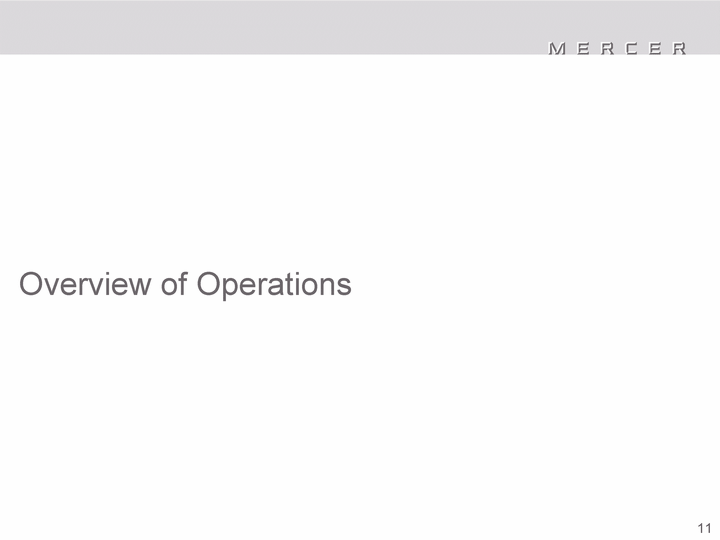
| Overview of Operations |

| Operating EBITDA margins compressed in the second-half of 2008 and through 2009 given falling pulp prices, a weakening US dollar and increased fiber costs due to reduced saw milling activity In recent quarters, margins have improved given strong pulp pricing Improving Financial Performance * For a reconciliation of the consolidated annual and quarter Operating EBITDA, please refer to the tables in slides 52 and 53, respectively. |

| Until 2006, Celgar was largely reliant on a broad group of sawmills for their residual chips US housing downturn caused spike in fiber costs From the peak in Q4 2008, Celgar has been able to reduce its per tonne fiber costs by close to €100/ADMT (or approximately 35%), on an annualized basis Celgar Has Addressed its Fiber Challenge Actions taken to address the fiber situation have been successful Invested C$10.0 million in a new, low-cost chip plant capable of supplying 50% of fiber needs Developed a large and sophisticated log procurement program Late 2006 through 2007, "stay open" premiums were paid to sawmills to secure residual chips Further sawmill curtailments and bankruptcy of two nearby large sawmills forced a rapid shift to log procurement and whole tree chipping Costs peaked in late 2008, with whole tree chips forming over 70% of Celgar's fiber needs |

| Mercer has a well-diversified and stable sales mix Sizeable leverage to European markets in particular Germany - Europe's largest NBSK market Significant exposure to China - the world's largest importer of pulp and the fastest growing pulp market Growing exposure to tissue / hygiene end uses which have a higher growth rate for NBSK than printing and writing papers Segmented Sales 2009 Mercer Sales by End-Use 2009 Mercer Sales by Geography Other countries 2% Europe, 54% |

| Financial Review |

| Corporate Structure and Long Term Debt Rosenthal (Germany) Celgar (British Columbia) Stendal (Germany) 74.9% US$300 million senior unsecured notes due December 2017 US$21 million senior unsecured notes due February 2013 (1) US$48 million convertible notes due January 2012 (2) US$27 million Celgar revolving credit facility US$5.2 million Rosenthal equipment loan €501 million term loan due September 2017 Principal amount of the loan is 80% guaranteed by the German government Interest rate of 5.28% until maturity Restricted Group 100% 100% The debt at Stendal is non-recourse to Mercer and its other operations Currently redeemable Strike price of US$3.30, redeemable July 2011 |
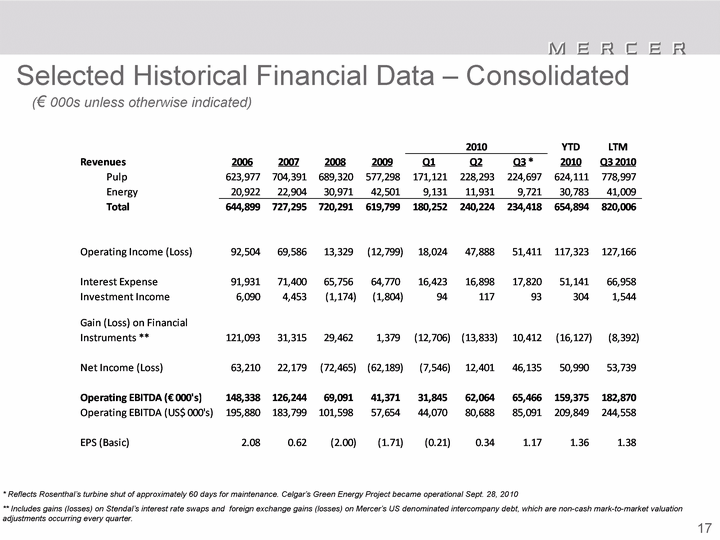
| Selected Historical Financial Data - Consolidated (€ 000s unless otherwise indicated) * Reflects Rosenthal's turbine shut of approximately 60 days for maintenance. Celgar's Green Energy Project became operational Sept. 28, 2010 ** Includes gains (losses) on Stendal's interest rate swaps and foreign exchange gains (losses) on Mercer's US denominated intercompany debt, which are non-cash mark-to-market valuation adjustments occurring every quarter. |

| Selected Historical Financial Data - Restricted Group (€ 000s unless otherwise indicated) * Reflects Rosenthal's turbine shut of approximately 60 days for maintenance. Celgar's Green Energy Project became operational Sept. 28, 2010 ** Includes foreign exchange gains (losses) on Mercer's US denominated intercompany debt, which are non-cash mark-to-market valuation adjustments occurring every quarter. |

| Balance Sheet |
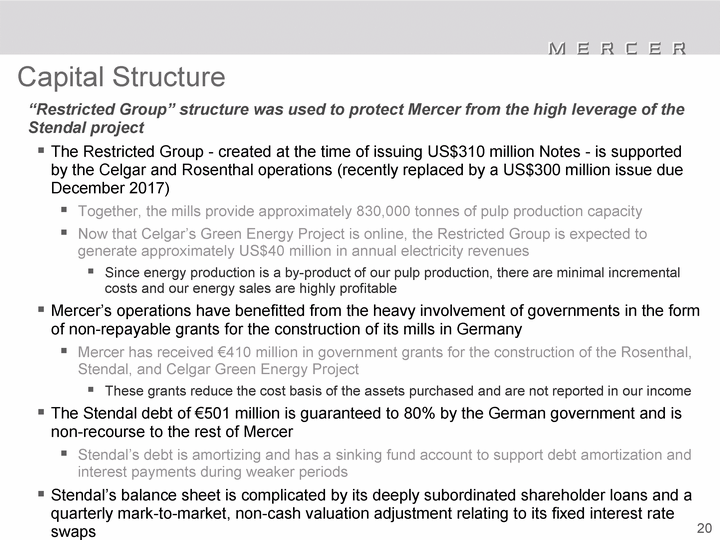
| Capital Structure "Restricted Group" structure was used to protect Mercer from the high leverage of the Stendal project The Restricted Group - created at the time of issuing US$310 million Notes - is supported by the Celgar and Rosenthal operations (recently replaced by a US$300 million issue due December 2017) Together, the mills provide approximately 830,000 tonnes of pulp production capacity Now that Celgar's Green Energy Project is online, the Restricted Group is expected to generate approximately US$40 million in annual electricity revenues Since energy production is a by-product of our pulp production, there are minimal incremental costs and our energy sales are highly profitable Mercer's operations have benefitted from the heavy involvement of governments in the form of non-repayable grants for the construction of its mills in Germany Mercer has received €410 million in government grants for the construction of the Rosenthal, Stendal, and Celgar Green Energy Project These grants reduce the cost basis of the assets purchased and are not reported in our income The Stendal debt of €501 million is guaranteed to 80% by the German government and is non-recourse to the rest of Mercer Stendal's debt is amortizing and has a sinking fund account to support debt amortization and interest payments during weaker periods Stendal's balance sheet is complicated by its deeply subordinated shareholder loans and a quarterly mark-to-market, non-cash valuation adjustment relating to its fixed interest rate swaps |

| Liquidity Position - Restricted Group (€ millions) As at Sept. 30, 2010 Comments Cash €48.4 Celgar Revolver Availability 7.2 Drawn by C$25.4 million; additional draws subject to borrowing base limits; matures May 2013 Rosenthal Facilities Availability 26.4 Undrawn; matures December 2012 Restricted Group Liquidity €82.0 US$ 111.5 * Restricted Group Net Working Capital €106.9 US$ 145.4 * * Converted at Sept. 30, 2010 rate of 1.3601 |

| Investment Highlights |

| It's Been a Transitional Year for Mercer The financial crisis of 2009 has resulted in the closure of a significant volume of NBSK capacity Celgar's new wood room has reduced its fiber cost by close to €100 / Admt from the peak in Q4 2008 Celgar's new turbine was commissioned in September 2010 and will add another C$20-25 million to the company's existing electricity revenue base of €43 million Mercer has extended the maturity of its convertible debentures to 2012 and its senior notes to 2017 |

| Key Investment Highlights Operates world-class, large, modern mills that produce high-quality NBSK pulp which is a premium grade of kraft pulp Strategically located mills, with excellent fiber baskets, in close proximity to key global markets Strong, long-term forecast supply/demand outlook for NBSK Significant and growing revenue from sale of excess renewable, carbon-neutral electricity Financial structure offers very high leverage to the pulp cycle Experienced, shareholder-focused management team and board of directors Improved liquidity performance |

| Appendix |
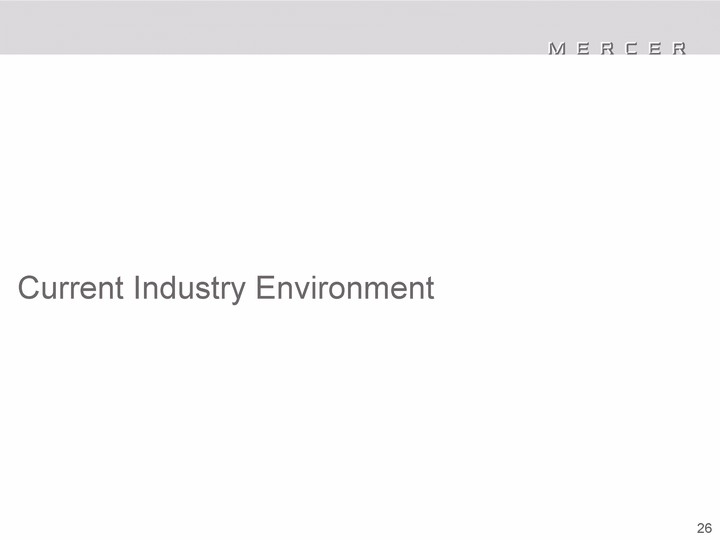
| Current Industry Environment |

| NBSK is Needed for Strength Management believes demand for NBSK will remain strong over the long term Reinforcing properties needed by modern production technology make NBSK an essential component in a wide range of paper, tissue and hygiene products Producers have generally substituted as much lower cost hardwood and recycled pulp into their products as possible, so any demand growth in their products should translate directly into demand growth for NBSK Demand for most paper grades in which NBSK is used, such as tissue, is forecasted to continue growing Improving global standards of living in countries such as China, aging populations, and growing interest in health and cleanliness are increasing demand for tissue and hygiene products For example, in China, tissue consumption increased by approximately 2.5 million tonnes between 2000 and 20091, and production volumes of fine paper and pulp based tissue are forecasted to grow at respective average annual rates of 13% and 10% from 2009 to 2013 2 Supply of NBSK is forecasted to remain flat or decrease The vast majority of the new pulp capacity that is coming online is hardwood There have been significant permanent softwood closures in recent years and global pulp inventories remain at near record lows The long term supply / demand fundamentals for NBSK pulp currently remain strong 1 Tissue PPI Annual Review, Income - McKinsey Institute, TerraChoice MSI; 2 Hawkins Wright - Defining the China Market (October 2009) |
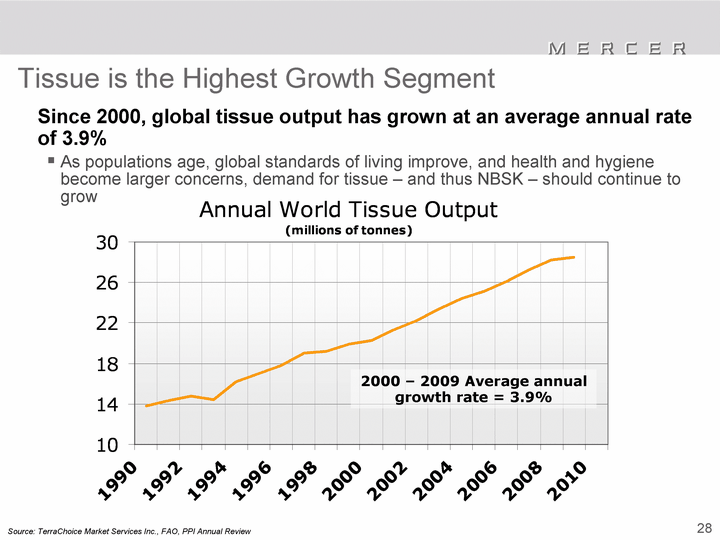
| Tissue is the Highest Growth Segment Since 2000, global tissue output has grown at an average annual rate of 3.9% As populations age, global standards of living improve, and health and hygiene become larger concerns, demand for tissue - and thus NBSK - should continue to grow Source: TerraChoice Market Services Inc., FAO, PPI Annual Review 2000 - 2009 Average annual growth rate = 3.9% |
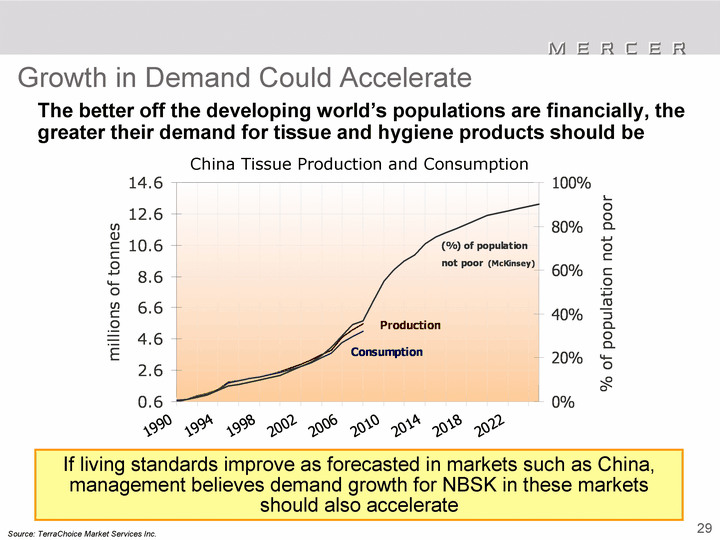
| Growth in Demand Could Accelerate The better off the developing world's populations are financially, the greater their demand for tissue and hygiene products should be Source: TerraChoice Market Services Inc. If living standards improve as forecasted in markets such as China, management believes demand growth for NBSK in these markets should also accelerate China Tissue Production and Consumption |

| 1 PPPC Flash Report - September 2010 Permanently Shut NBSK Capacity Despite recent restarts caused by record high pulp pricing, softwood pulp markets remain tight due to steady demand growth and the permanent closure of high cost capacity. Global softwood inventories at the end of September total 27 days of supply 1 Source: TerraChoice Markets Services Inc., company press releases |

| Global Supply of BSK Source: TerraChoice Markets Services Inc. Most of the new pulp capacity that is coming online is hardwood pulp capacity. Total global softwood pulp capacity is expected to remain flat as only one new softwood mill is being built (Ilim) to replace the old, high cost softwood mills being shut |

| Climate Change Presents Mercer with Opportunities Climate change has emerged as a very significant issue and Mercer is well positioned to benefit from the changes that are expected to result Both Canadian and German governments provide support and incentives for green initiatives and energy production Our German operations receive superior energy rates for selling their generation under the green tariff structure of the German Renewable Energy Act (EEG) In 2009, Celgar was awarded C$57.7 million under the Canadian government's Green Transformation Program Celgar signed a long term energy purchase agreement with the local utility, delivering 238,000 MWh of bioenergy annually to the grid at higher green rates Became operational on Sept. 28th, 2010 Mercer has already garnered significant benefits in the emerging carbon economy and we remain actively engaged with policy makers to maximize these benefits going forward Changes we see coming from climate change include: Full utilization of forests Increased silviculture / thinning Increased cogeneration Technologies for bioproducts and the markets for these bioproducts will develop |
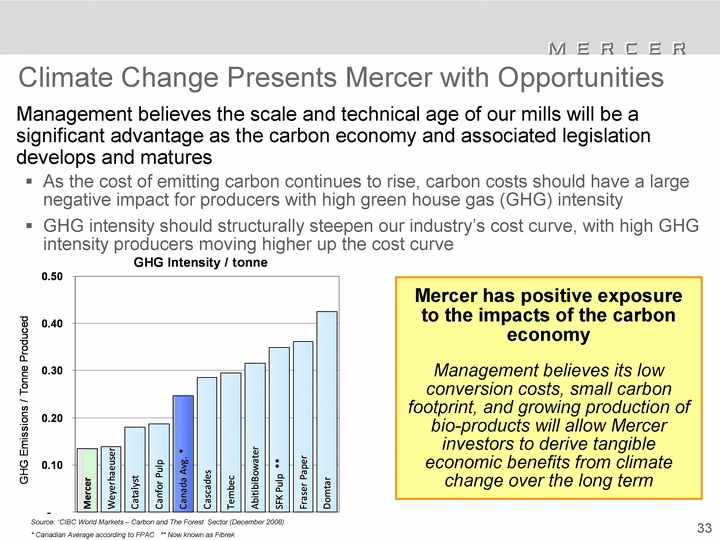
| Management believes the scale and technical age of our mills will be a significant advantage as the carbon economy and associated legislation develops and matures As the cost of emitting carbon continues to rise, carbon costs should have a large negative impact for producers with high green house gas (GHG) intensity GHG intensity should structurally steepen our industry's cost curve, with high GHG intensity producers moving higher up the cost curve Climate Change Presents Mercer with Opportunities Source: "CIBC World Markets - Carbon and The Forest Sector (December 2008) * Canadian Average according to FPAC ** Now known as Fibrek Mercer has positive exposure to the impacts of the carbon economy Management believes its low conversion costs, small carbon footprint, and growing production of bio-products will allow Mercer investors to derive tangible economic benefits from climate change over the long term |

| Operations |

| Restricted Group - Rosenthal Mill Location: Blankenstein, Germany, approximately 250 km south of Berlin Pulp Production Capacity: 330,000 ADMT / year Electricity Generating Capacity: 57 MW Key Features: Built in 1999, the mill is modern, efficient, and ISO 9002 certified Strategically located in central Europe, offers a superior value proposition to customers Allows customers to operate on just in time inventory, lowering their costs and making Rosenthal the preferred supplier Close proximity to stable fiber supply and nearby sawmills One of the largest biomass power plants in Germany In 2009, generated €14.5 million (US$20.3 million) in revenue from electricity sales A "world class" operation which has continuously increased pulp and electricity production |
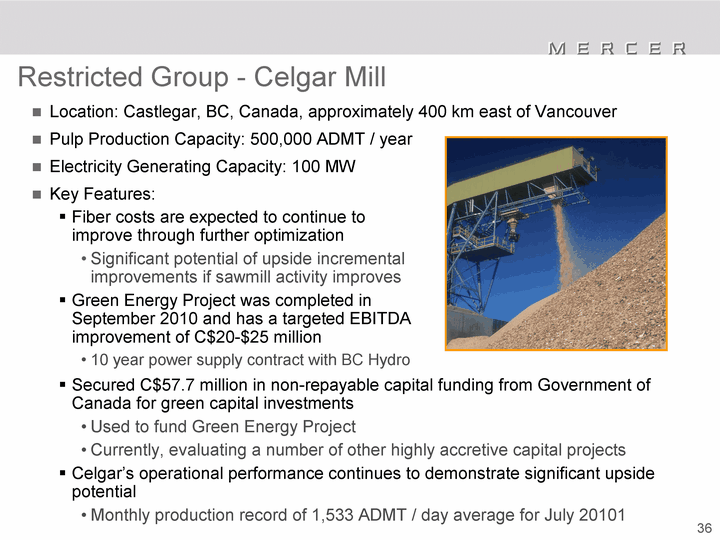
| Restricted Group - Celgar Mill Location: Castlegar, BC, Canada, approximately 400 km east of Vancouver Pulp Production Capacity: 500,000 ADMT / year Electricity Generating Capacity: 100 MW Key Features: Fiber costs are expected to continue to improve through further optimization Significant potential of upside incremental improvements if sawmill activity improves Green Energy Project was completed in September 2010 and has a targeted EBITDA improvement of C$20-$25 million 10 year power supply contract with BC Hydro Secured C$57.7 million in non-repayable capital funding from Government of Canada for green capital investments Used to fund Green Energy Project Currently, evaluating a number of other highly accretive capital projects Celgar's operational performance continues to demonstrate significant upside potential Monthly production record of 1,533 ADMT / day average for July 20101 |

| Unrestricted Group - Stendal Mill Location: Stendal, Germany, approximately 100 km west of Berlin Pulp Production Capacity: 645,000 ADMT / year Electricity Generating Capacity: 102 MW Key Features: Completed in 2004, it's one of the newest and largest pulp mills in the world ~75% Mercer owned Debt is 80% government guaranteed, low interest and non-recourse to Mercer Located in a strong forest base and is well positioned to serve both European and off- shore customers One of the largest biomass power plants in Germany In 2009, exported 300,286MWh and generated €27.3 million (US$38.1 million) in revenue from electricity sales Due to Stendal's excellent production capacity, the mill has further potential to add generating capacity |
